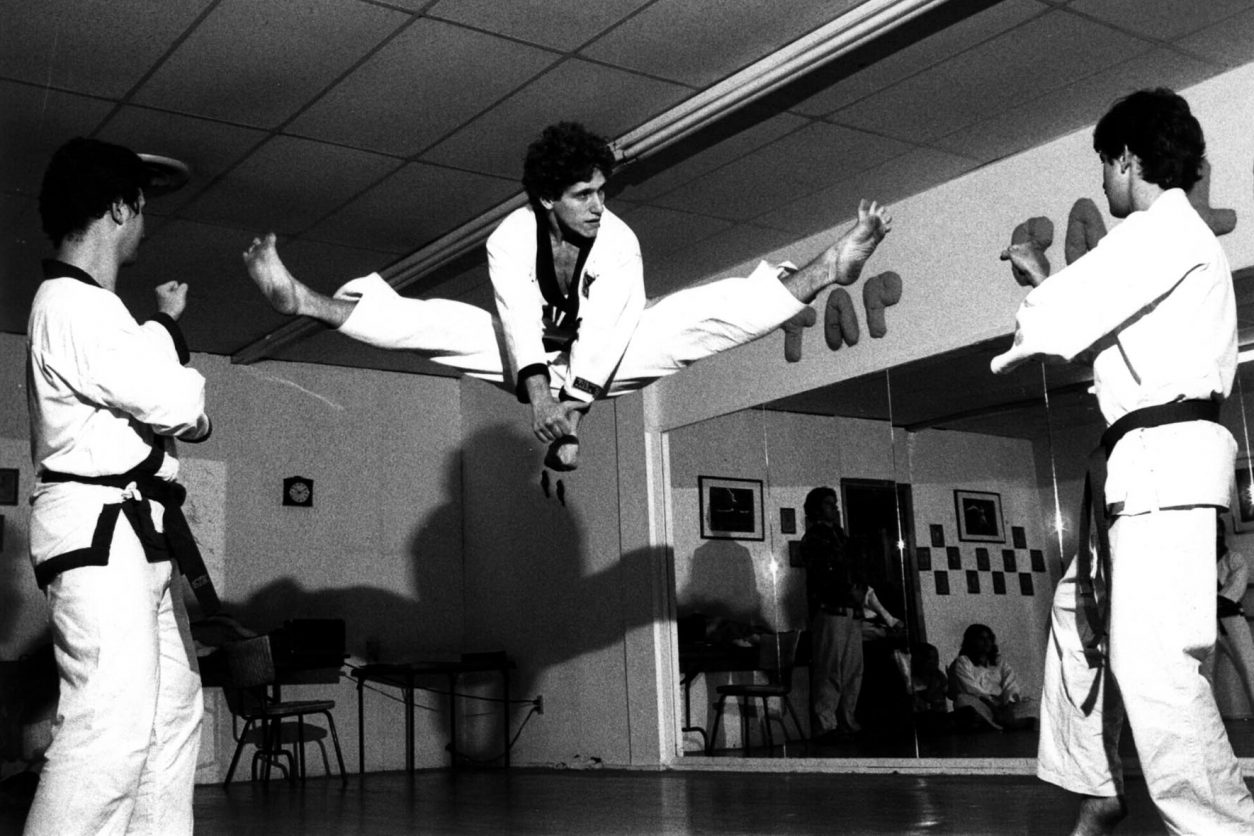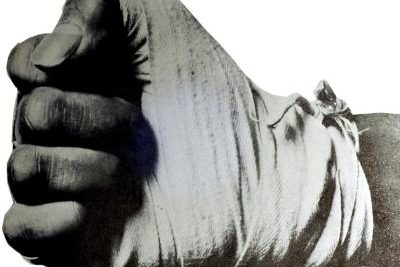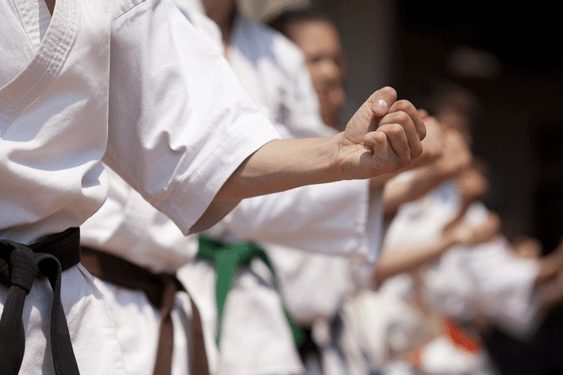This is part 2 of my chat with Antonio Diaz, Karate World Champion (WKF) in kata and Certified Master of the Universe™. See part 1 for more details.
J: Was there some specific point in your life, or your carreer, when you realized “Hey, I could become world champion in this stuff!”?
D: “Well, like I told you earlier today, I started competing at a very young age for seniors. At my first Pan American Championships I was 18 years old. So eventually I started getting good results, but I remember the first time I competed in Europe, at the Paris Open. I was standing there, you know, with people like Milon [legendary kata athlete, who ended up becoming 3 times World Champion and 10 times European Champion] on my side. I was used to seeing these people on videos only! So I was just standing there with big eyes, watching the people, and not even warming up [laughing]! So that was a great feeling. Then I got bronze there, in Paris Open, a few times. Not until 2002 did I win Paris Open for the first time. And it was at that time when I said “Okay, I think I can make it!”. Then I started competing in the Golden League, you know Dutch Open, Italian Open… So at that time I started to get known by the European people and referees so… around that time, 2002/2001 I started to think I could do it.”
J: But it took…
D: “…it took TEN YEARS!” [laughs]
J: Did you always get support from your family, sensei and friends?
D: “Yes, yes… yes. Always, every time. They have always been very supportive and I think even before I started competing for the national team, when I used to go to these small private competitions, they used to take me there and pay for me. They knew that I liked it, so they were always there.”
J: So it was not like in the movies; when a kid faces tough bullies and critics, so he decides to train really hard and finally becomes the best – proving everyone wrong?
D: “No, no, I don’t think so. Only… only sometimes I’ve had some bad times, of course. For example, like I said I entered the national team at a very young age, so I went at 18 years old to the World Championships for seniors in Brazil. 1998. At that time they still used the point system, instead of flags like today. But I made it to the top 8! I was 8th. Then, next year it was the first Jr. World Championships, in -99, Bulgaria. So I thought “Okay, I’m top 8 in the Senior World Championships, so I can easily make it here!”. But I didn’t make it. For Juniors! So for me that was really disappointing. After that I started to train harder. That was a big situation, but there are others too. Like in Mexico, when it was too much pressure on me and I had to change my focus. There’s always some things that are hard, which will make you look forward to make things better.”
J: I see… Obviously training and competing is a lot about feelings and mentality to you. But it’s also the physical part. So how much, percentagewise, do you think Karate is mental and how much is physical?
D: “Umm… [silence]… if I have to say percent… maybe 50/50. Because, of course, the physical part is very, very important in Karate. But I think for kata; specially the mental part and the mental training is very important. Because you have to visualize, you have to imagine. Sometimes it’s almost a little crazy no? You have to imagine you are really fighting someone. So I’d say 50/50.”
J: Okay! So let’s go over to the physical then. Many people want to know what a regular training session looks like for you. Can you give a general outline?
D: “Yeah, of course. In the off-season I try to give a lot of time for kihon training and basic training. And then the kata training. I always like to train Karate in the morning. Usually I’m not depending on a schedule, but if I have other jobs to do in the day I do them later, because I don’t like to train for a certain time. I don’t like to think “Okay, now I have 30 minutes for kihon, etc.”, so I try to make the training flow depending on how I’m feeling. Later in the afternoon I do physical training.”
J: So who exactly plans your training sessions? Do you have a coach for that?
D: “Well, like I told you before… or no, let me tell you a little about my Karate history. As you know I started in Shitokai, and with this sensei I trained a long time. Eventually he separated from Shitokai, and we did some Ryuei-ryu with Sakumoto [Tsuguo] sensei. I even went to Okinawa for training there. So my sensei was by himself, but then he started refereeing a lot and moved to USA. So we separated around 2004, and from that time I started basically training by myself. It was a really difficult time. I had the physical training planned by the federation, you know, sport science with proper planning and periodization. But I had almost 4 years training by myself! Until I one day realized that I need something, I need someone to look! At that time I really wanted to go to Japan. So a Japanese sensei in USA, Yamazaki [Kiyoshi], told me that I should go Tottori for Inoue [Yoshimi] sensei. So I went there and…”
J: What year was this?
D: “In the beginning of 2008. Yeah. January. So I went there and spent one month there. I was really supposed to be only two weeks! But I changed it, because I wanted to stay longer! I think from the beginning we made a good connection, we clicked, and I liked his personality and also his techniques. So I thought “Now I have a teacher, and I’m going to stay here!”. At first I went only for some training, but later I thought I was going to be also formally in his organization, you know, keep it their way. I think I was a little bit lost, then I found him [Inoue sensei] and had someone to look up to. So now I try to go there at least once a year.”
J: So you get some points to work on and…
D: “…yeah, I get the points and I go home and work, you know. But that year I went 3 times! Two times for training and one time for the World Championships, when I also stopped by for training. And also when he is in Europe or USA I always try to meet him for training. So I’m always trying to get a lot from him [laughing]! Then I go home and work on that.”
J: So how does your training shift when it becomes competition season? What’s the biggest difference(s)?
D: [sips some Vitamin Water] “Well, I think in the off-season I use the time to do more physical training, and you know, a lot of standing kihon for long times! Because when it’s time for competition you need to focus more on doing the kata. When I don’t have a competition near I mainly focus on physical training and kihon.”
J: And do you always train with a gi? Or do you have some other, special, training clothes that you use?
D: “No, I train with gi. Yeah. But when I went to Okinawa we were training in sportswear, with Sakumoto sensei. I think it was too hot for gi! But normally I always train in a gi, yeah.”
J: What about video camera? Do you train with a video camera, filming your kata?
D: “Yeah, I try to record myself, but not every day. It’s especially important when I’m training by myself because sometimes you cannot check yourself, like you have the hand here [shows a strong hikite] and then you start doing it here, and then here [let’s his hand slip forward] and you don’t notice it. So sometimes you’re perfecting mistakes!”
J: Yeah, that would totally suck! By the way, do you train any traditional self-defense Karate besides your competition training? Any joint locks, bunkai, grappling…?
D: “[Inhales] Aaah… I would like to do that more. But now I’m more focusing on the kata aspect, you know, for this high level of competition.”
J: So do you make any money out of this? Or do you have a “regular” job too?
D: “Well, I studied communications, and I have a major in marketing. So I used to work in my state’s sports institute, in the press department. I worked one year there. But now I’m more focused only with Karate. I represent the [Inoue-ha Shito-ryu] organization in Venezuela, but I don’t have any dojo where I’m teaching. I’m just technical director for some other dojo, so when they have test for example I go there, or seminars.”
J: What?! You don’t have a dojo? So where do you train?
D: “No, I have a dojo. A small dojo for me, for training. But not for classes. Maybe sometimes the instructors from other dojos come to me and we train together, but it’s not like an open dojo. It’s just my personal space. But right now, also, we received some money from the government which covers all the major competitions. So I’m trying to make a living out of this.”
J: That’s great! Maybe you should make some DVD’s, posters, t-shirts…
D: “Yeah [laughs]! Antonio Diaz t-shirt! [poses]”
J: I think a World Champion deserves a decent salary! But, let me ask you this: Is Karate always fun to you? Or do you sometimes get… bored?
D: “Sometimes, sometimes, yes, sometimes. I cannot lie about that. You know, sometimes routine is hard… but… [silence]… but, I think it’s different when you know that you have to do something. You know you have to repeat it a lot of times. It’s not like when you train for fitness and fun, you know “Okay, I change the routine every day”. If you know you have to do this exercise, because it’s going to make you better – you just have to do it. But sometimes it’s like, you wake up and project [pretends to wake up tired] “Aaah, I don’t want to wake up, I have to do so many kata, aaah!”. But a technique that works for me sometimes, when wake up and start projecting and thinking about the day, is to focus on one thing at a time. First thing first. Like; right now I just think about getting up and washing my face. Then I think about next thing. And then in the end I can look back and say “Okay, I did all the training today” and I can feel satisfied that I really did it. That’s a good feeling! But sometimes, yeah, I get bored.”
To be continued in part 3!



2 Comments